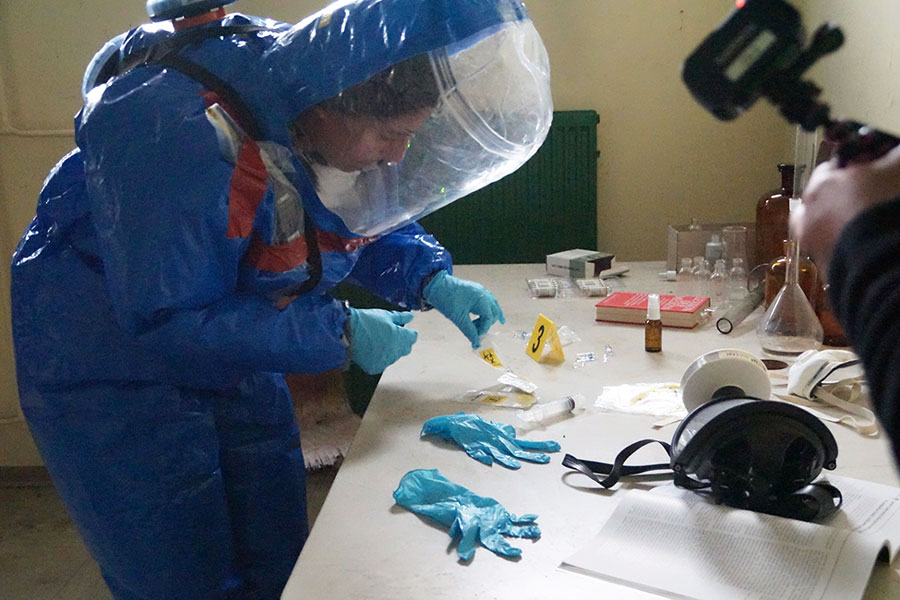In a world increasingly shaped by geopolitical instability and information warfare, the ability to distinguish natural disease outbreaks from deliberate biological events has become a pressing security concern. A new study published in Emerging Infectious Diseases assesses the readiness of the United Nations Secretary-General’s Mechanism (UNSGM) for investigating alleged uses of chemical or biological weapons.
The study, led by experts from Spiez Laboratory (Switzerland), the Robert Koch Institute (Germany), and other international institutions, provides critical insights into how the global community can respond to ambiguous or suspicious disease outbreaks—especially in conflict zones where misinformation often proliferates.
This article draws on findings from a full-scale capstone field exercise conducted in Berlin in 2022, coordinated by the UN Office for Disarmament Affairs (UNODA) and evaluated by an international team. The exercise tested the UNSGM’s ability to rapidly deploy and execute a complex investigation in a high-pressure, simulated scenario involving a fictitious plague outbreak suspected to be the result of a bioweapons attack.
Why Investigating Unusual Outbreaks Matters
Outbreaks of unknown or ambiguous origin—such as the 2023 Legionnaires’ disease incident in Poland or the Ebola outbreak in Uganda—often lead to speculation about their causes. In politically charged or conflict-affected settings, such speculation can quickly evolve into disinformation or unfounded allegations of bioterrorism. The UNSGM exists to independently assess such claims and determine whether a biological weapon was used.
However, the UNSGM—while grounded in UN General Assembly mandates and supported by the Security Council—has rarely been activated. Its last deployments were to investigate chemical weapon use, most notably in Syria in 2013. Until now, its readiness to respond to a biological incident had not been comprehensively tested.
Key Findings from the 2022 Capstone Exercise
The capstone exercise conducted in Berlin tested the operational readiness of the UNSGM under realistic and complex conditions. Nineteen experts from 16 countries participated, simulating a full investigation—from crossing politically tense borders to interviewing non-English-speaking witnesses, collecting environmental and clinical samples, and managing international media scrutiny.
Major findings include:
- Operational Readiness Confirmed: The UNSGM is capable of deploying expert teams and conducting on-site investigations of suspected bioweapons use. Participants demonstrated familiarity with protocols and effective team coordination.
- Gaps in Equipment and Predeployment Planning: While the UNSGM does not prescribe specific equipment, the exercise emphasized the need for pre-identified, fit-for-purpose gear and streamlined logistical arrangements. A new predeployment package is now in development to reduce activation time.
- Training Needs Identified: The exercise led to the development of specialized courses in sampling, investigative interviewing, and managing biosecurity logistics, including certified training for handling and shipping infectious substances.
- Importance of Communication and Security: Teams must be trained not only in technical aspects but also in navigating media attention, disinformation, and the psychological toll of high-stakes missions. The UNSGM will now prioritize training in external communication and team resilience.
Implications for Public Health and National Security
For public health authorities and global health security stakeholders, the ability to credibly investigate suspicious outbreaks is more than a technical capability—it is a bulwark against erosion of public trust. In a biological attack or disinformation campaign, the legitimacy of national health institutions may be questioned. A well-functioning, internationally recognized investigative mechanism helps protect not only global norms but also domestic confidence in outbreak response.
From a national interest perspective, participation in the UNSGM provides countries with trained experts who gain invaluable experience in high-stakes investigations. It also allows countries to shape global norms and procedures—an increasingly important consideration as geopolitical tensions rise and accusations of biological weapons violations become more frequent.
U.S. Disengagement and the Risks of Leadership Vacuums
The 2022 capstone exercise demonstrated what international coordination and investment can achieve—but it also highlighted the risks posed by uneven global engagement. The United States, once a cornerstone of multilateral arms control and health security efforts, has increasingly stepped back from these roles. Under the Trump-Vance Administration, funding for international disarmament, biosecurity training, and support to UN investigative mechanisms like the UNSGM has seen significant reductions.
Compounding this, the administration’s sweeping cuts to domestic scientific research and academic funding have undermined the very foundation of technical expertise needed for outbreak investigations. Many of the trained experts who serve on UNSGM rosters—including laboratory scientists, outbreak investigators, and policy advisors—come from U.S. universities and federally supported institutions such as the Centers for Disease Control and Prevention (CDC), National Institutes of Health (NIH), and academic biosecurity centers. Budget cuts to these institutions shrink the pipeline of qualified personnel, reduce the capacity for high-containment laboratory training, and weaken national credibility in global forums.
Without sustained investment, the U.S. forfeits its leadership in shaping investigative standards, participating in high-level missions, and protecting its own national interests in the event of a suspected bioweapons incident abroad or at home. Moreover, diminished U.S. engagement creates space for adversarial powers to fill the vacuum, potentially distorting the norms and transparency that underpin international biological weapons accountability.
The Trump-Vance Administration’s broader retreat from arms control diplomacy and its skepticism of multilateralism threaten to erode decades of U.S. leadership in biological nonproliferation. Rebuilding academic and institutional partnerships—domestically and internationally—will be critical to restoring U.S. influence and ensuring preparedness for future biological threats.
Strengthening the Mechanism for the Future
As disinformation, conflict, and emerging infectious threats converge, strengthening global mechanisms to investigate suspected biological incidents is an urgent priority. The 2022 UNSGM capstone exercise demonstrates real progress—and underscores the value of sustained investment in training, coordination, and trust-building. A robust, agile, and internationally credible investigative capability is not just a technical asset—it’s a cornerstone of health security and a critical deterrent against the misuse of biology.
Brackmann M, Blasse A, Carvalho JG, et al. Assessing Readiness of International Investigations into Alleged Biological Weapons Use. Emerging Infectious Diseases. Vol. 31, No. 7, July 2025.


